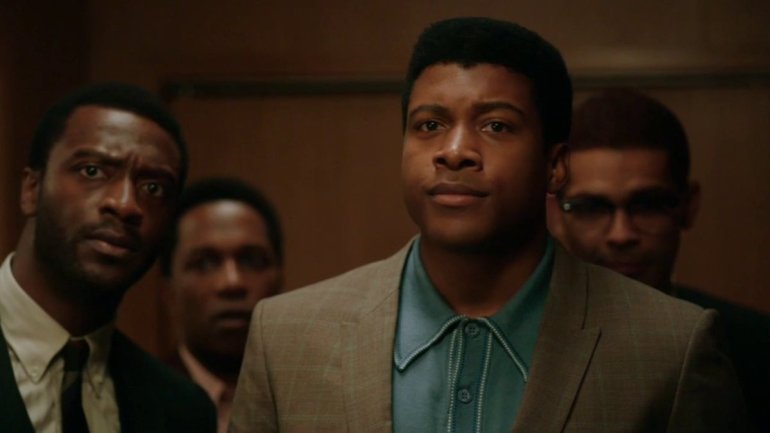The beginning of Regina King‘s directorial debut, One Night In Miami finds some of the greatest figures in Black history at their low points or a crossroads. Cassius Clay (Eli Goree) had just lost to Henry Cooper. Malcolm X (Kingsley Ben-Adir) is deciding on leaving the Nation of Islam. Sam Cooke (Leslie Odom Jr.) attempts to play his music to an all-white crowd that meets him with a frosty reception. Jim Brown (Aldis Hodge), despite being the prominent football figure that he is, experiences blatant racism from childhood figure, Mr. Carton (Beau Bridges). A stage play by Kemp Powers, (who also wrote the screenplay for the film), One Night In Miami, what a night of conversation would be between four of the most prominent voices of the 1960s.
While the four men got together in February 1964, details of their conversations are sparse. That’s where King and Powers together try to help fill in the blanks with the historical context of what we know. Shortly after Clay’s heavyweight title victory over Sonny Liston, the four agreed to meet in what some think is a victory party. What really is in store is the finality of Cassius converting to Islam and changing his name. Also, Malcolm has the idea to speak to the plight of the civil rights movement and find a place for each of his friends within.
While the movie is mostly within the confines of a hotel room, the performances make the film come alive beyond where it’s located. The collection of men melts into their characters in almost a picture-perfect portrayal. Goree invokes Ali’s clever variable and dialect. Ben-Adir captures Malcolm X’s passion and also nervousness as he thinks people are out to get him. Odom Jr. personifies Cooke’s charisma and Hodge embodies Brown’s stoicism. While embellished, King takes great care in accurately depicting how these men would move and the context they would discuss.
The heart of the film’s argument falls between Malcolm X and Sam Cooke, then protrudes outward. Malcolm wonders why each man with all their gifts just stand together against the racist population that continues to constrict them. Cooke argues against this with how his music royalties work, providing the context that Black figures should occupy spaces to make a change. It’s a quarry for all the men in the room. Jim Brown was contemplating retiring from the NFL and going into Hollywood. Still knowing that film companies would only put him into stereotypical roles. For Clay, turned Ali, his affliction with the Nation would bring its own set of problems in his career. Not to mention Malcolm leaving. Is it worth it to divide and conquer or stay fortified as a force that a mass may perceive to be as hostile? It’s a sad realization that likability determines who listens to you the most.
The arguments get heated – with Malcolm staying entrenched in his position. Even speaking about Bob Dylan’s impact, where he feels Cooke should be. One Night In Miami brings a lot of feelings to the service that are applicable today. What is the cost of social change, and where is it best to apply its strategies for long-term change? Would you take Malcolm’s side or Cooke’s? Would you be in the middle like Jim Brown? There may not be a right answer, but great ideas into how hard it was to tackle the plights of racism. Especially in a time of Jim Crow and segregation, where the voices of Black Americans were drowned out.
King also takes instances to show flashes of the men in their element. When Malcolm speaks to the power of Cooke’s voice, they show a concert in where he commands a crowd with just his voice. Another example would be Cassius Clay’s post-fight confident banter at the end of the Sonny Liston fight. They place every color tone and detail down to the clothing of the era with care. What one would give to be a fly on the fall during that night in Miami. Thankfully, with the help of the directorial precision of King, we are one step closer to that dream.
Photo Credit: Amazon Studios













